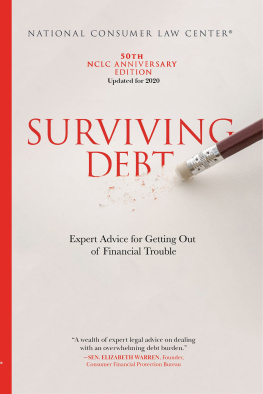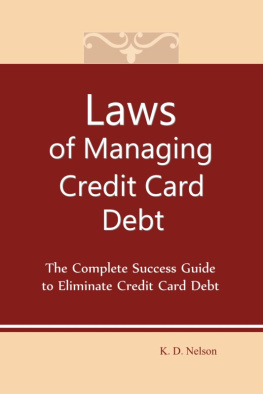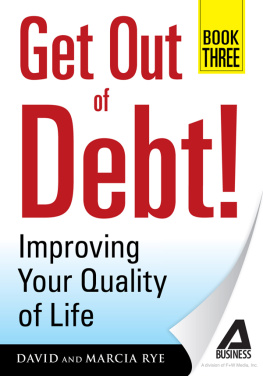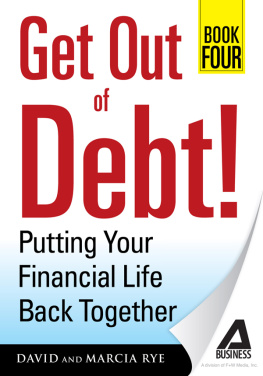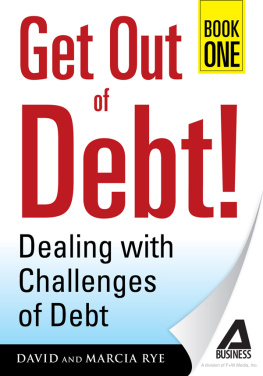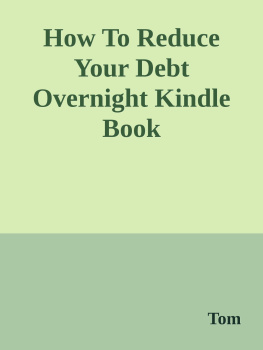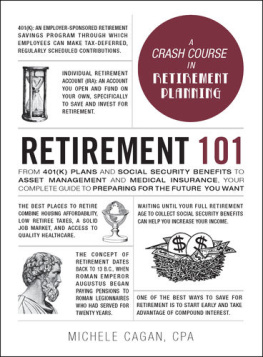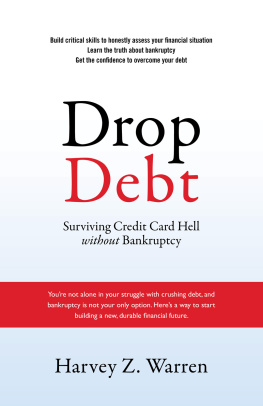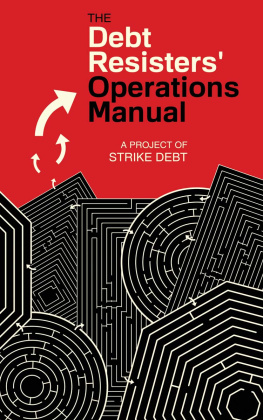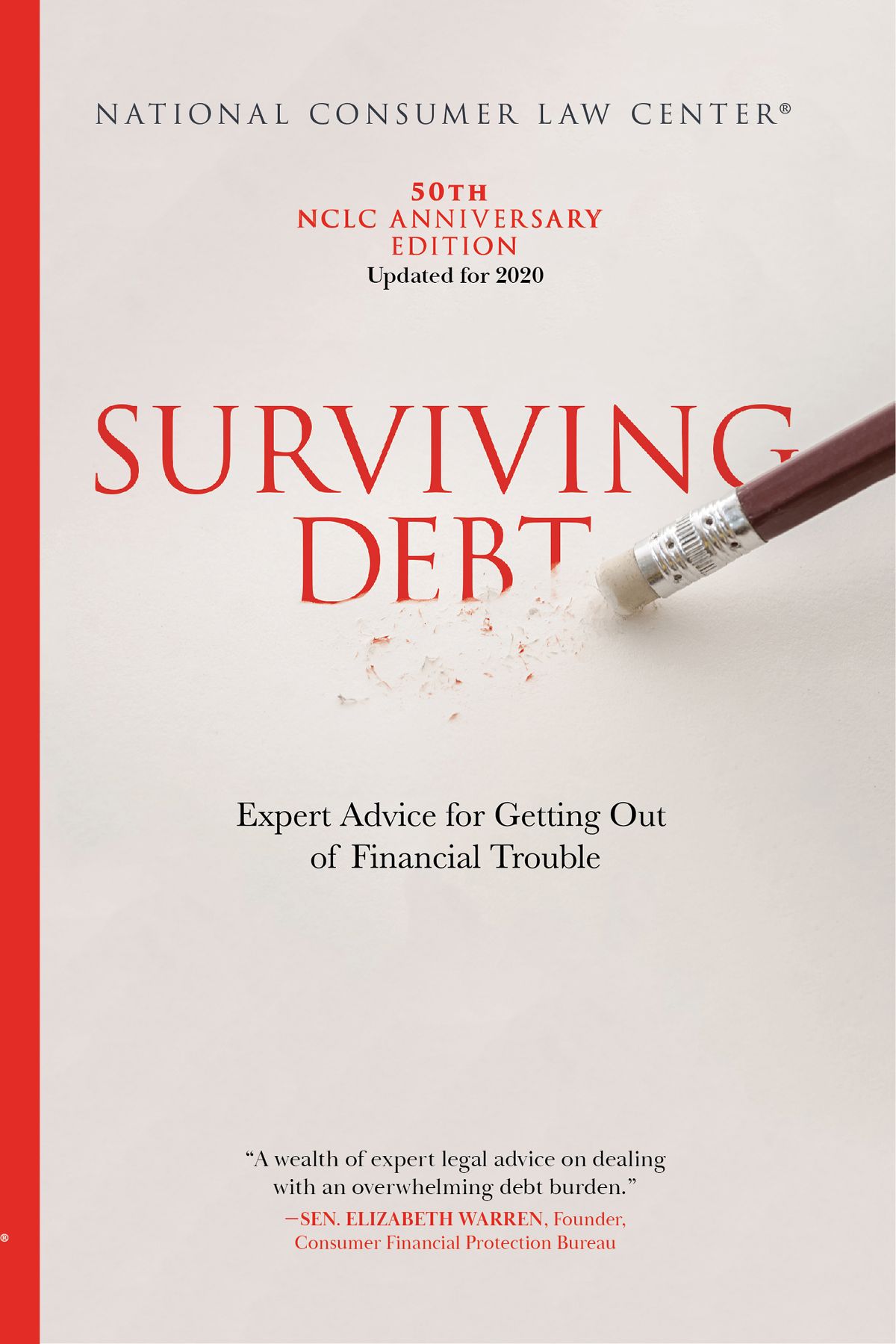
NATIONAL CONSUMER LAW CENTER
SURVIVING DEBT
The Consumer Law Practice Series
Debtor Rights
Fair Debt Collection
Consumer Bankruptcy Law and Practice
Student Loan Law
Repossessions
Access to Utility Service
Mortgages & Foreclosures
Mortgage Lending
Mortgage Servicing and Loan Modifications
Home Foreclosures
Consumer Litigation
Collection Actions
Consumer Class Actions
Consumer Arbitration Agreements
Consumer Law Pleadings
Credit and Banking
Fair Credit Reporting
Truth in Lending
Consumer Credit Regulation
Credit Discrimination
Consumer Banking and Payments Law
Deception and Warranties
Unfair and Deceptive Acts and Practices
Federal Deception Law
Automobile Fraud
Consumer Warranty Law
For more information on print and digital resources from the National Consumer Law Center, visit www.nclc.org/library.
NATIONAL CONSUMER LAW CENTER
50th
ANNIVERSARY EDITION
Updated for 2020
SURVIVING
DEBT
Expert Advice for Getting Out
of Financial Trouble
THE NATIONAL CONSUMER LAW CENTER
Americas Consumer Law Experts
Copyright 1992, 1996, 1999, 2002, 2005, 2006, 2008, 2010, 2013, 2016, 2019, 2020 by National Consumer Law Center, Inc.
National Consumer Law Center and NCLC are registered trademarks of National Consumer Law Center, Inc.
All Rights Reserved.
For reprint permissions or ordering information, contact Publications, NCLC, 7 Winthrop Square, 4th Floor, Boston MA 02110, (617) 542-9595, Fax (617) 542-8028, E-mail:
Library of Congress Control No. 2019918335
ISBN: 978-1-60248-187-9
This book is intended to provide accurate and authoritative information in regard to the subject matter covered. This book cannot substitute for the independent judgment and skills of a competent attorney or other professional. Non-attorneys are cautioned against using these materials in conducting litigation without advice or assistance from an attorney or other professional. Non-attorneys are also cautioned against engaging in conduct which might be considered the unauthorized practice of law.
Cover design by Francisco Javier Rivera.
Since 1969, the nonprofit National Consumer Law Center (NCLC) has used its expertise in consumer law and energy policy to work for consumer justice and economic security for low-income and other disadvantaged people, including older adults, in the United States. NCLCs expertise includes policy analysis and advocacy; consumer law and energy publications; litigation; expert witness services; and training and advice for advocates. NCLC works with nonprofit and legal services organizations, private attorneys, policymakers, federal and state government, and courts across the nation to stop exploitative practices, to help financially stressed families build and retain wealth, and to advance economic fairness.
NCLC publishes a nationally acclaimed series of legal treatises on all major aspects of consumer credit and sales. The treatises, available individually or as a set, are available in print volumes and in continuously updated digital format on the NCLC Digital Library. Visit the NCLC Digital Library at www.nclc.org/library to subscribe to news and analysis from NCLC attorneys and to read the first chapter of each treatise for free.
@nationalconsumerlawcenter @nclc4consumers
www.nclc.org/library
Surviving Debt (12th ed. 2020) is the culmination of years of work and contributions from experts in the field. We also have received support from the AFL-CIO, the United Auto Workers, the Public Welfare Foundation, various church groups, and NCEE/AT&T Consumer Credit Education Fund. The views in this book are NCLCs and not those of any other entity.
NCLC attorneys contributing to this edition include: Jen Bosco, Carolyn Carter, Joanna Darcus, Charlie Harak, Brian Highsmith, April Kuehnhoff, Sarah Mancini, Andrew Pizor, John Rao, Geoff Walsh, Olivia Wein, and Chi Chi Wu. Also contributing are Ron Abrams of the National Veterans Legal Services Program, Pat Baker of Massachusetts Law Reform, Eric Dunn of the National Housing Law Project, Elizabeth Maresca of Fordham Law School, Cathy Schoen, and Claudia Wilner of the National Center for Law and Economic Justice.
Jon Sheldon authored the 1992, 2019, and this edition; Gary Klein authored the 1996, 1999, and 2002 editions; Odette Williamson co-authored the 2002 edition; John Rao co-authored the 2005 and 2006 editions; and Deanne Loonin co-authored the 2005 and 2006 editions and authored the 2008, 2010, 2013, and 2016 editions.
Although too many to thank individually, we also recognize the many current and former NCLC attorneys and other experts in the field for their assistance in this project through eleven prior editions over the last 28 years.
Special thanks to Denise Lisio for editing this edition and for production management, Eric Secoy for editing a prior edition, Katie Eelman and Josh Ambre for editorial assistance, Julie Gallagher for typesetting, and Francisco Javier Rivera for cover design.
Contents
PART I. Basic Debt Survival Strategies
PART II. Dealing with Specific Types of Debt
PART III. Your Bankruptcy Rights
PART IV. Glossary
Rule #1: Prioritize Debts Whose Non-Payment Immediately Harms Your Family
Non-payment of certain debts have sudden and dire consequences for your family. Deal with these debts immediatelyeither pay these debts first or otherwise follow advice in this book on how to manage these debts.
Never pay smaller, low priority debts just because you cannot keep up with high priority debtsIf I cant pay my mortgage, at least I will keep up with my credit cards. This is a bad idea. If you dont have enough money to make full payments on high priority debts, try to negotiate with the creditor to accept lower payments or save the money to be used later to get caught up, to cover the initial costs of moving to a new residence, or to pay for another car if your car is repossessed.
High Priority Debts Include:
- Court judgment debt. You have been sued on a debt and a court has ruled for the creditor. The creditor has rights to seize part of your wages, bank accounts, and even your home or other property. explains your rights to protect your income and assets from the seizure and steps you should take to deal with court judgment debt.
- Criminal justice debt. Non-payment of debt arising from a criminal proceeding (such as fines, fees, and costs) can lead to immediate loss of your drivers license, loss of income or assets, or even incarceration. explains how to deal with criminal justice debt.
- Automobile loans or leases can result in a creditor repossessing your car after you miss only a few payments. This is high priority debt, particularly if you need your car to get to work or for other essential transportation. Your rights to respond to a threatened or actual repossession are examined at .
- Rent payments for your residence (or for the lot on which your manufactured home sits). Swift eviction can result if you do not keep up these payments. Steps to deal with an eviction threat are set out at .
- Utility bills. Non-payment of utility bills can lead to termination of gas, electric, water, and other utility service. explains how to stop a utility disconnection, reconnect service, and otherwise deal with utility bills. In some states, programs to help people avoid disconnection may make utility bills a somewhat more flexible priority in the short term.
Next page
